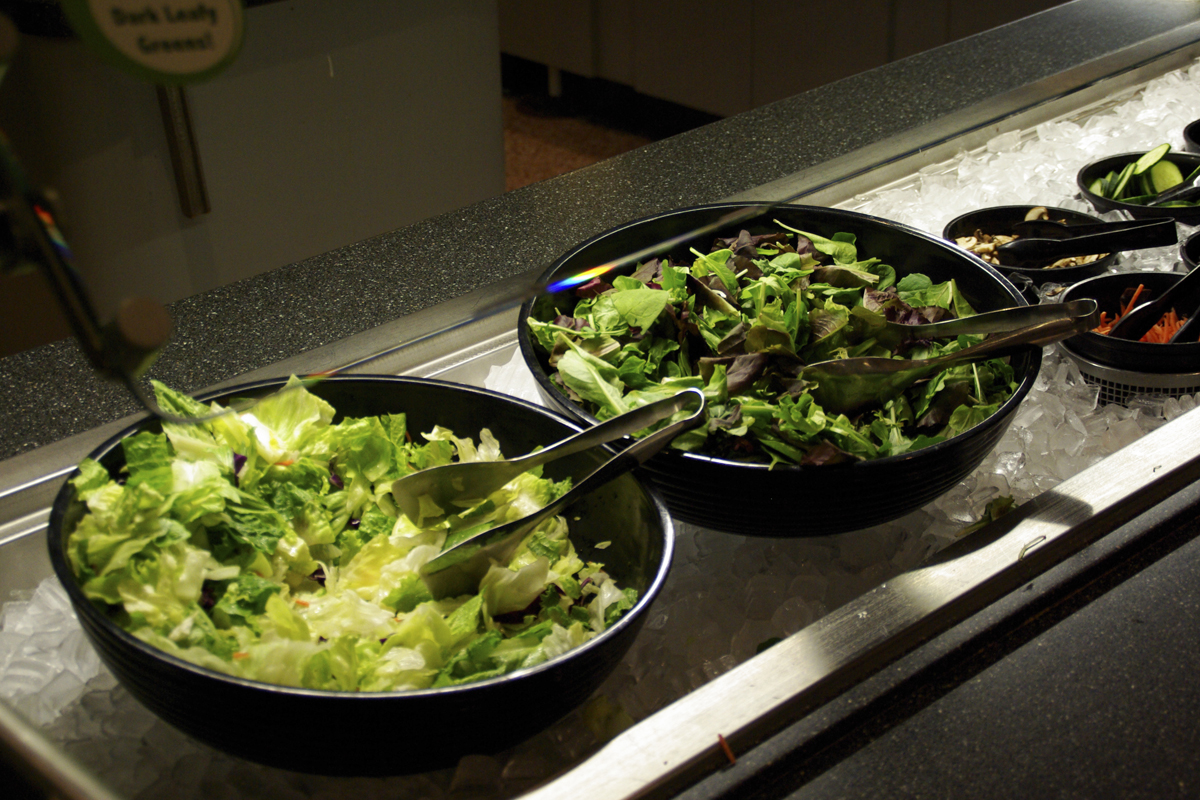Students want more vegan options
A petition began making its way through USU Dining Services last week which now bears 1,750 names. If successful, it will give students and staff more vegan and vegetarian dining options on campus.
Eden Williams, president of USU’s vegan and vegetarian student organization, said the overall goal of the petition is to make the university aware of vegan options and urge them to accommodate the needs of students who eat differently.
“We’re not trying to get rid of meat,” she said, “we’re just trying to provide vegan and vegetarian options, because I don’t think people should have to navigate or fight for their food especially in a place they’re supposed to feel comfortable.”
Williams and other members of Vegan News began work with peta2, a branch of PETA that works directly with high schools and universities, earlier this month. Williams said a petition was handed out last week near the library and in the TSC, and the goal was to get 1,500 signatures. In two days, the number was past 1,600. Williams said the Student Sustainability Council and faculty have also shown full support for the push to make vegan options more accessible.
Ryan Huling, assistant administrator of peta2, corresponded with Vegan News and said the results of the petition only serve as proof of the growing desire for vegan food options. According to a survey of 100,000 students conducted by the contracting group Aramark in 2010, the number of vegan and vegetarian college students has doubled. The hope is that USU will catch on to the trend, he said.
“We’re trying to convince the university to join the 21st century,” he said.
USU Dining Services provides some vegetarian options, but Williams and Huling said finding vegan options is much harder, especially for students whose only source of food comes through their meal plans.
Because vegans refuse to eat and use animal byproducts, it’s more difficult to find vegan foods, especially if they are not labeled, Williams said .
Lauren Mata, a member of Vegan News, said, “There’s no way to know exactly what’s in the food here, so even if you get a salad dressing, you don’t know if they’ve put any oils or fats in there. I don’t like it. It’s impossible to be a vegan here.”
Williams said one Vegan News member asked for a veggie burger and staff members finally retrieved one out of the back of the freezer after spending quite some time looking for it.
“It’s kind of a fight for your food,” Mata said. “You don’t want to be a burden for them, but at the same time, you’ve got to eat.”
Huling said one success of the petition could be an increased variety of vegetarian and vegan options on campus, such as vegan pizza or barbecue. In some cases, he said, universities will take meals with meat and remove it to call it vegetarian. That, he said, is inefficient and fails to add variety to vegan and vegetarian meals.
By providing a wider array of foods, USU Dining could appeal to a wider array of people, Huling said.
“I think they could easily offer replacements,” Mata said. “Even when you go to get cereal, they only have regular milk, and you have to go up and specially request the soy milk. They could just as easily put it out there for us.”
Alan Anderson, executive director of USU Dining Services, said USU does have a lot of vegetarian options, but he is grateful for the chance to assess the demands of students up on campus.
“We’d be foolish as a business not to try to meet the needs of our customers, so if there’s a major demand out there, then we’re all about doing everything in our power to meet that demand,” he said. “That’s one of the things the petition will actually do is give us an opportunity to see what the real demand is opposed to the assumed demand.”
Anderson admits that USU Dining Services fails to fully inform people of available vegetarian or vegan options, but he also said it is important that the specific needs of vegan and vegetarian customers be determined.
“That’s what this really comes down to: Trying to understanding the specifics. Because if someone walks in and says, ‘We want more vegetarian items,’ well, I don’t know what that means. Do you want more green vegetables? Do you want more veggie patties?”
Once specifics are determined, more options could be made available, he said.
“In the Hub we could put a whole new outlet that’s just vegan and just vegetarian,” he said. “That may be an option based on what we feel the demand is.”
Anderson and Huling both said accommodating the demands of vegan and vegetarian customers would not necessarily be more expensive. It would simply depend upon the demand.
Williams said though animal abuse is one reason why students choose to go vegan or vegetarian, many students choose to do so because of the health benefits and the lessened impact on the environment. Processed food has been linked to cancer and high dairy intake often causes obesity, she said. Vegan and vegetarian students are simply trying to live healthier, and USU Dining Services should encourage such lifestyle choices, she said.
“If there are people who are trying to find food, especially food that makes a really positive impact on their health and the environment, I think that’s something that the school should really support,” Williams said.
– ariwrees@gmail.com

